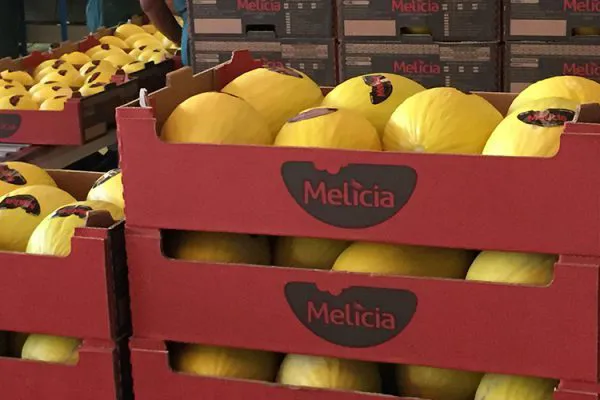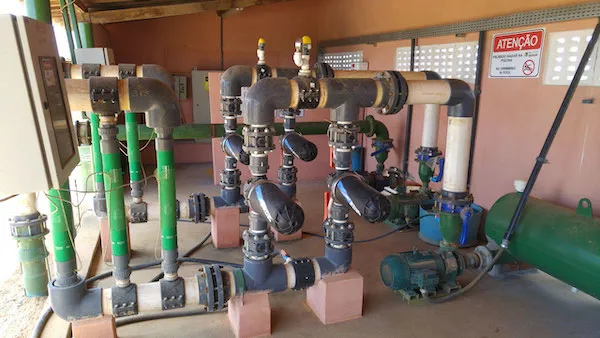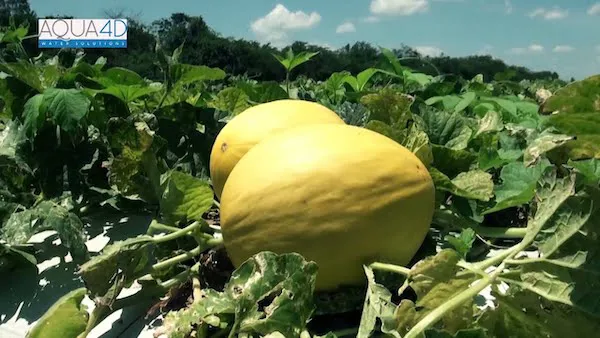Many growers throughout the world have to use low-quality water for irrigating their crops. This might be because it is the only water available to them, or to save on costs. This low-quality water often has high levels of salt and this can be harmful to the crops as well as to the soil. Swiss company AQUA4D has developed a water-treatment technology that brings irrigation optimization, better water management and higher yields.

Increase in the Brazilian melon production
In Brazil, the melon production has more than quadrupled in the past twenty years. In some regions such as Rio Grande do Norte, melon production is one of the most important economic activities, with huge export demand as well as ever-increasing domestic consumption. In areas of the world where water is scarce, though, the use of saline water for irrigation is a common practice.
Brazilian fruit producer Agricola Famosa, for example, uses EC 3.0-6.0 saline water to irrigate their crops, which includes melons, papaya, banana, passion fruit and more. Several years of salts accumulation in the soil decreased productivity and prevented them from achieving more than one cycle per year. They were faced with having to cease activity on these lands and move melon production to a new area.
Interview with Paul Dantas of Agricola Famosa.
In the year 2014 Agricola Famosa began their first validation study with the AQUA4D system in order to reduce soil salinity and increase productivity. The total production increased by between 7-17%, with better export quality and less rejected fruit. Additionally, due to the system’s leaching effect, Agricola Famosa could return to two cycles per year on the same land. Chris Thomas of AQUA4D explains: “The product helps bring a circular sustainability to the users. They are able to use less chemicals, be more efficient with their water use, and their land use becomes more sustainable as well.”
Open field versus greenhouse growing
The technology can be used by both open-field growers, as well as greenhouse growers. “We work for about 80% of the time with open field growers and we work with growers in more than forty countries throughout the world. The technology is the same whether it’s for greenhouses or open field – we provide an ongoing consultancy service as well and discuss with the growers what issues they are looking to solve. Are they looking for less clogging, less salinity, or increased water savings? The system is then installed and used in a manner that is most beneficial for them,” Thomas shares.

In Tunisia, AQUA4D is also used by greenhouse melon growers. A 2012 study at the Chott-Meriem Higher Institute of Agronomy looked at Citirex F1 melons in a greenhouse environment, testing specifically for resistance to nematode attacks, testing untreated water versus untreated water & nematicides versus AQUA4D treated water. It showed a 42% production increase, with nematode control more efficient than the chemical nematicides and reduced plant damage. In Spain, results found a +7.6% increase for commercial production in crops, and in Costa Rica, a grower saw a 94% decrease in nematode populations around the melon plants, as well as significant improvement in fruit quality and reject rates.
Thomas explains: “The technology is very simple to use, essentially ‘plug-and-play’. The system is attached to the last stage of an existing irrigation setup, right before the water is applied to the crops. The efficacy of this water-smart technology has been proven with every kind of crop, whether it’s melons, avocados, or almond and pistachio trees.”

Expansion on the horizon
Due to the water-saving potentials AQUA4D offers, the product is proving to be very valuable in drought-stricken areas. “We have some exciting projects with Chilean wine growers, and are also expanding to South Africa, pursuing water savings and salinity solutions. We’ve just opened up an office in California as well, with a new Chief Agronomist, to help expand work with the almond and pistachio growers in the region,” Thomas concludes.
 For more information:
For more information:
AQUA4D Water Solutions
Tel: +41 27 480 30 35
Email: info@AQUA4D.com
www.AQUA4D-irrigation.com
